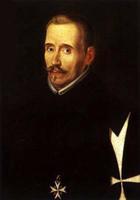Lope de Vega
Lope de Vega Poems
Lord, what am I, that with unceasing care
Thou did'st seek after me, that Thou did'st wait
Wet with unhealthy dews before my gate,
And pass the gloomy nights of winter there?
...
POOR bark of Life, upon the billows hoarse
Assailed by storms of envy and deceit,
Across what cruel seas in passage fleet
My and sword alone direct thy course!
...
Desmayarse, atreverse, estar furioso,
áspero, tierno, liberal, esquivo,
alentado, mortal, difunto, vivo,
leal, traidor, cobarde y animoso:
...
SHEPHERD! who with thine amorous, sylvan song
Hast broken the slumber that encompassed me,
Who mad'st Thy crook from the accursed tree
On which Thy powerful arms were stretched so long!
...
Es la mujer del hombre lo más bueno,
y locura decir que lo más malo,
su vida suele ser y su regalo,
su muerte suele ser y su veneno.
...
¿Qué tengo yo que mi amistad procuras?
¿Qué interés se te sigue, Jesús mío
que a mi puerta, cubierto de rocío,
pasas las noches del invierno escuras?
...
Dulce desdén, si el daño que me haces
de la suerte que sabes te agradezco,
qué haré si un bien de tu rigor merezco,
pues sólo con el mal me satisfaces.
...
Lope de Vega Biography
Félix Arturo Lope de Vega y Carpio was a Spanish playwright and poet. He was one of the key figures in the Spanish Golden Century Baroque literature. His reputation in the world of Spanish literature is second only to that of Cervantes, while the sheer volume of his literary output is unequalled, making him one of the most prolific authors in the history of literature. Nicknamed "The Phoenix of Wits" and "Monster of Nature" (because of the sheer volume of his work) by Miguel de Cervantes, Lope de Vega renewed the Spanish theatre at a time when it was starting to become a mass cultural phenomenon. He defined the key characteristics of it, and along with Calderón de la Barca and Tirso de Molina, he took Spanish baroque theatre to its greater limits. Because of the insight, depth and ease of his plays, he is regarded among the best dramatists of Western literature, his plays still being represented worldwide. He was also one of the best lyric poets in the Spanish language, and author of various novels. Although not well known in the English-speaking world, his plays were presented in England as late as the 1660s, when diarist Samuel Pepys recorded having attended some adaptations and translations of them, although he omits mentioning the author. He is attributed some 3,000 sonnets, 3 novels, 4 novellas, 9 epic poems, and about 1,800 plays. Although the quality of all of them is not the same, at least 80 of his plays are considered masterpieces. A friend to Quevedo and Juan Ruiz de Alarcón, the sheer volume of his lifework made him envied by not only contemporary authors such as Cervantes and Góngora, but also by many others: for instance, Goethe once wished he had been able to produce such a vast and colourful work.)
The Best Poem Of Lope de Vega
Tomorrow
Lord, what am I, that with unceasing care
Thou did'st seek after me, that Thou did'st wait
Wet with unhealthy dews before my gate,
And pass the gloomy nights of winter there?
Oh, strange delusion, that I did not greet
Thy blest approach, and oh, to heaven how lost
If my ingratitude's unkindly frost
Has chilled the bleeding wounds upon Thy feet.
How oft my guardian angel gently cried,
“Soul, from thy casement look, and thou shalt see
How He persists to knock and wait for thee!”
And oh, how often to that Voice of sorrow,
“Tomorrow we will open,” I replied,
And when the morrow came I answered still “Tomorrow.”
—H. W. Longfellow (translator).
From: Hispanic Anthology: Poems Translated from the Spanish by English and North American Poets, collected and arranged by Thomas Walsh. G. P. Putnam's Sons, New York, 1920.
